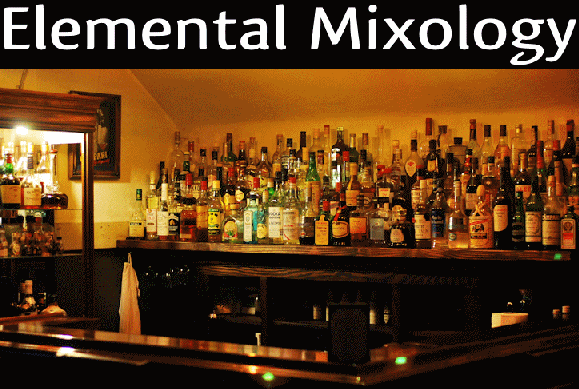Here is another student-requested post defining the various types of liquor.
Liquors - alcoholic beverage products containing distilled alcohol.
Spirits - liquor that is sold at 70 proof (35% alcohol-by-volume) or higher, that also contains no, or less than 2.5 % (by weight in the finished product), sugar syrup.
Primary Spirits - flavorful spirits distilled from a characteristic fermentate.
Primary Spirits of Wine - flavorful spirits distilled from fermented fruit.
[brandy, Cognac brandy, Pisco brandy, apple brandy, kirschwasser, apricot eau de vie, etc.]
Primary Spirits of Beer - flavorful spirits distilled from fermented grain.
[whiskies]
Primary Spirits of Toddy - flavorful spirits distilled from fermented nectar.
[Ceylon arrack, traditional rum, light rum, agricole rhum, cachaça, mezcal, Tequila mezcal, etc.]
Secondary Spirits - flavorful spirits distilled from material macerated in neutral spirits.
[ouzo, Lebanese arak, German geist of any kind, genever, gin, aquavit, absinthe, etc.]
Neutral Spirits - spirits distilled from any fermented material so that they will be virtually flavorless.
[vodka]
Cut Spirits - flavorful spirits that have been cut with neutral spirits, and often flavored.
[rum-verschnitt, inlander rum (Stroh 80)]
Flavored Spirits - spirits that have been flavored after distillation, but not sweetened.
[spiced rum, flavored rum, flavored vodka, etc.]
Liqueurs - liquors that are sweetened with at least 2.5% (by weight in the finished product) sugar syrup.
Primary Liqueurs - liqueur that are produced by sweetening primary spirits, without adding other flavors. Some primary liqueurs of fruit spirits have juice of the same fruit added. High quality primary liqueurs should be 60 proof, or more.
[maraschino liqueur]
Secondary Liqueurs - liqueurs that are produced by sweetening secondary spirits, without adding other flavors. High-quality secondary liqueurs should be 60 proof, or more.
[traditional Curaçao liqueur, triple-sec Curaçao liqueur, Chartreuse liqueur, pastis liqueur, Galiano liqueur, gin liqueur (Hayman's 1820), etc.]
Flavored Primary Spirit Liqueurs - liqueurs that are produced by flavoring and sweetening primary spirits. Some flavor from the primary spirit should be noticeable. High-quality flavored primary spirit liqueurs should be 60 proof, or more.
[orange-flavored brandy liqueur (Grand Marnier), apricot-flavored brandy liqueur, proprietary flavored brandy liqueur (Bénédictine), proprietary flavored whisk(e)y liqueur (Drambuie), flavored agricole liqueur (Clément Créole Shrubb), etc.]
Flavored Secondary Spirit Liqueurs - liqueurs that are produced by flavoring and sweetening secondary spirits. Some flavor from the secondary spirit should be noticeable. High-quality flavored secondary spirit liqueurs should be 50 proof, or more.
[sloe-flavored gin liqueur (please use only the Plymouth brand), proprietary flavored gin liqueur (Pimm's #1)]
Ratafia Liqueurs - liqueurs produced by sweetening a maceratioin of fruit and/or fruit-stones and/or nuts and/or other botanicals in spirits of any type so that the noticeable flavor will be of the macerated material rather than the spirit. High-quality ratafia liqueurs are usually less than 50 proof.
[amaretto liqueur, hazelnut ratafia liqueur (Frangelico), raspberry ratafia liqueur (Chambord), Irish cream liqueur, falernum liqueur, allspice liqueur, cherry ratafia liqueur (Heering), elderflower ratafia liqueur (Saint Germain), ginger ratafia liqueur (Domaine de Canton),etc]
Crème Liqueurs - liqueurs produced by sweetening flavored neutral spirits, usually to a point of more than 30% (by weight in the finished product) sugar syrup. High-quality crème liqueurs are usually less than 50-proof.
Huile Liqueurs - liqueurs produced by sweetening flavored neutral spirits to a point of sugar content less than that for crème liqueurs. Huile liqueurs are often mis-labelled in the U.S.A. as schnapps liqueurs or crème liqueurs. High-quality huile liqueurs are less than 70-proof.
[huile de pomme liqueur (Berentzen), huile de melon liqueur (Midori), etc.]
Schnapps Liqueurs - liqueurs produced by sweetening flavored neutral spirits to a point of sugar content less than that for crème liqueurs, but sold at spirit-proof. Schnapps liqueurs were made to profit from the market demand by German immigrants for schnaps. German schnaps are unsweetened spirits, not liqueurs, that often have the flavor of fermented-or-macerated fruit-or-botanicals. Schnapps liqueurs were created as cheap American ersatz. Schnapps liqueurs were traditionally sold at high-proof, since they were a substitute for spirits. High-quality schnapps liqueurs should be 70 proof, or more.
[apple-flavored schnapps liqueur, peach-flavored schnapps liqueur, cinnamon-flavored schnapps liqueur, etc]
Fortified Wines - wines that are fortified with a spirit (usually brandy), often stopping fermentation and preserving more of the grape-flavor and sweetness that in normal wines. The presence of distilled alcohol means that they are technically liquor.
[Sherry, Port, Madeira, etc.]
Aromatized Wines - wines that are fortified with a spirit-maceration of aromatic botanicals, usually after fermentation of the wine is complete. Many aromatized wines are also additionally-sweetened.
[sweet vermouth (rosso/rouge), medium vermouth (bianco/blanc), dry vermouth (a waste of time), rouge quina (Dubonnet), blanc quina (Lillet), etc.]
Bitters - spirit-macerations of aromatic botanicals, traditionally combined with water-infusions of the same botanicals. When mixed with other liquors, all bitters should remove most of the sensation of the harshness of the alcohol.
Additive Bitters - bitters that are not sweetened and are meant to be used in small amounts.
[aromatic additive bitters (Angostura, Fee Brothers, Peychaud's, Boker's, Bitter Truth), orange additive bitters (Angostura, Fee Brothers, Bitter Truth), peach additive bitters, celery additive bitters, cherry additive bitters, lemon additive bitters, grapefruit additive bitters, cacao additive bitters, etc.]
Grand Bitters (a.k.a. Beverage Bitters, Kräuterlikör, amaro, amer) - bitters that are meant to be used in larger amounts. Grand bitters are often sweetened. Almost all grand bitters are proprietary.
[Campari, Amer Picon (defunct), Torani Amer (substitute for original-formula Amer Picon), Picon Club, Picon Biere (grand bitters for beer), Cynar, Aperol, Berechovka, Jägermeister, Zwack Unicum, Caperitif (defunct), Fratelli Fernet Branca, Fratelli Fernet Menta, Luxardo Fernet Branca, Calisaya, Amaro Montenegro, etc.]
Saturday, July 24, 2010
Subscribe to:
Post Comments (Atom)


domaine de canton rocks! TRY IT
ReplyDeleteIt is quite nice.
ReplyDelete